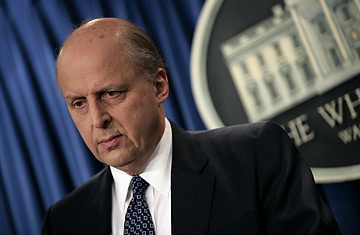
Director of National Intelligence John Negroponte
The move, long rumored but always denied by senior Bush officials, has caught Washington off guard. It is widely believed to stem from Negroponte's dissatisfaction with the top intelligence job, to which he was nominated in February 2005, and a desire to return to his roots as a diplomat. The Director of National Intelligence (DNI) was a post created to provide streamlined control to 16 U.S. intelligence agencies after the failures that led to 9/11 and the mistaken assessments of Saddam Hussein's weaponry. Negroponte, 67, was the America's first DNI and his departure after little more than 20 months on the job is being viewed as a setback for America's beleaguered spy community and the continuity of leadership at the top that many believe it needs.
By most accounts, Negroponte did a creditable job as DNI, rapidly building the organization's staff to more than 1,000 as he helped to push out former CIA boss Porter Goss, replacing him with Negroponte's own deputy, Air Force Gen. Michael Hayden. But Negroponte was long rumored to be impatient with the intelligence job, and eager to return to his career as a diplomat. A likely replacement for Negroponte is retired Adm. Mike McConnell, who served as director of the National Security Agency (NSA) from 1992 to 1996 and is currently a senior vice president at the consulting firm Booz Allen Hamilton.
Negroponte is expected to bring much-needed help and Iraq expertise to Rice at the State Dept, where she has functioned without a deputy and other key aides for several months. Negroponte was ambassador to Baghdad in 2004 and 2005 and, before that, U.S. representative at the United Nations. He has long been associated with America's Iraq policy; as an experienced diplomat but also a hardliner, he was a frequent briefer for President Bush. "Secretary Rice has now said she wants to focus on Arab-Israel peace talks, and other pressing matters which she would not be able to without someone like Negroponte to take over Iraq policy," one high-ranking State Department veteran told TIME. "You also have to consider that if Rice leaves office before the end of the Bush Administration, it would be prudent to have a heavy hitter like Negroponte in place who could be confirmed by the Senate to succeed her in the top job."
The expected resignation of Negroponte, 67, comes as President Bush is in the midst of developing a new Iraq strategy, including possibly sending thousands of additional U.S. troops. Bush is expected to announce the new policy soon, almost certainly before Negroponte can be confirmed by the Senate for his new assignment.
Negroponte's predecessor in the No. 2 job at State was Robert Zoellick, who stepped down in July to accept a position with Goldman Sachs, the New York-based investment banking firm. Rice reportedly approached several candidates to replace him over a period of months, without finding anyone willing to step into the difficult post.
Among those to who declined the job, according to knowledgeable officials, was Robert Gates, to whom Rice offered the job while he was still president of Texas A&M. Gates, for whom Rice had once worked at the NSC, later accepted the job of President Bush's new Defense Secretary, replacing Donald Rumsfeld.
Then in early November, Rice fixed on Negroponte. As a longtime career diplomat, he is widely respected at State, but also considered tough-minded enough to carry out Bush's plans for Iraq and apparent intention to beef up the U.S. troop presence there. "He's a diplomat's diplomat," Rice spokesman Sean McCormack said. "He is somebody who is a close colleague to the Secretary. She has a very good working relationship with him. He has the confidence of the President."
